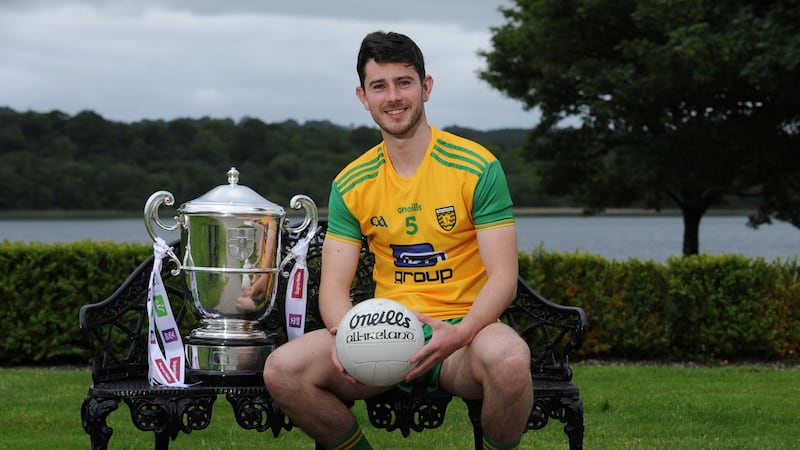HAVING been forced into two prolonged breaks last year, Ryan McHugh knows how important an issue concussion has become for the GAA.
And the Donegal star believes there is still scope for education and improvement at a time when the matter continues to hit the headlines.
Earlier this week former Galway footballer Cormac Bane revealed he had been forced to retire from the game following a succession of concussion injuries in recent years. The 35-year-old was told another blow to the head could lead to long-term memory loss, seizures, severe mood swings and, possibly, epilepsy.
There were also concerns for Armagh midfielder Jarlath Og Burns following an accidental clash of heads in their drawn Ulster Championship semi-final against Cavan, although the Orchard County have insisted there was no indication the player suffered a concussion.
McHugh has previously revealed he picked up “knocks” in three National League games last year, leading to a complete eight-week break from football, before a further head injury sustained playing for club Kilcar in September 2018 saw him take another 10 weeks away from the game.
Thankfully, the two-time Allstar insists he is feeling no ill-effects now.
And McHugh says he hasn’t consciously changed the way he plays to avoid the risk of picking up another head injury.
“I have to say I’m 100 per cent, never have any symptoms, never get any headaches any more, and touch wood it stays like that.
“I probably haven’t changed it that much, no. Maybe last year I was playing more as a half-forward, this year I’m playing more as a half-back, maybe that’s more tactical from a management point of view than to do with me.
“It is extremely difficult when you’re in the heat of Championship battle to try and change your game. Donegal as a team are trying to kick the ball more and play more offensively so maybe that changes things a wee bit.”
And while McHugh’s successful return to action is to be welcomed, question marks remain over the GAA’s ‘if in doubt, take them out’ approach to suspected concussions.
As it stands a set of guidelines, rather than rules, are in place.
Those guidelines state that any player feared to have sustained a concussion should be immediately removed from the field of play. If confirmed, the protocols permit a return to competitive action a minimum of seven days post-diagnosis.
The grey area surrounds that initial diagnosis, as well as adherence to those guidelines and, as a result, McHugh believes there is still work to be done.
“It’s like everything - it can always get better,” he said.
“I can only speak from my experience and I was taken care of 100 per cent by Dr Kevin Moran and our medical team. When I received the bangs Kevin took me out straight away and the next day I was in for a CT scan to assess everything, and unfortunately it showed up that I had a concussion.
“On medical advice I wasn’t allowed to play for eight weeks at the time. I was handled extremely well, but yes, we can always get better and get more research on concussion.”
Indeed, in the case of McHugh’s first concussion, he didn’t suffer the delayed effects until the middle of a Donegal training session 10 days later.
“We were training in Convoy and I just felt dizzy, and my vision got a bit blurry.
“I went straight over to [Dr] Kevin [Moran], he pulled me straight out and got it checked out. The scan showed I had a slight bleed on the brain and that was the reason I really had to take the eight weeks out.
“It’s a strange injury because you’re looking at somebody and you maybe don’t realise there’s something wrong with them.”
In a further bid to avoid those kind of injuries, referees were issued with a fresh set of guidelines earlier this year aimed at stamping out head-high and dangerous tackles in both football and hurling.
According to those guidelines, the sanctions relating to “illegal charge/collision” are determined by the following criteria: if contact is made to opponent’s head; if opponent has no opportunity to protect himself; if contact/impact is excessive or causes injury; if the elbow/forearm/hurley is part of the contact; if the player making contact jumps or has two feet off the ground; if the player making contact had a realistic alternative by way of challenging opponent; the direction and distance covered by the player who makes contact.
Down’s Caolan Mooney was shown a straight red card after catching Armagh’s Aidan Nugent with his shoulder, while Paul Mannion suffered the same fate following a frontal challenge on Louth’s Conal McKeever.
Mannion’s red card was later rescinded upon review after the GAA’s Central Hearings Committee found the alleged infraction unproven.
Plenty of similar offences have also gone unpunished, however.
Yet McHugh admits that, although those new guidelines were put in place to protect players like him, he has sympathy for the referees trying to carry out the letter of the law.
“It is probably difficult for referees,” he said.
“In my case sometimes you’re just smaller than the man; if the likes of Michael Murphy or those sort of boys are tackling me… I suppose it’s difficult for a referee to distinguish what’s deliberate and what’s not deliberate.
“You can just misplace a tackle and you don’t mean to hurt anybody by that. It’s getting that right balance between what’s deliberate and what’s not deliberate. To be fair to the referees, I think they’ve been doing a top job this year.”






